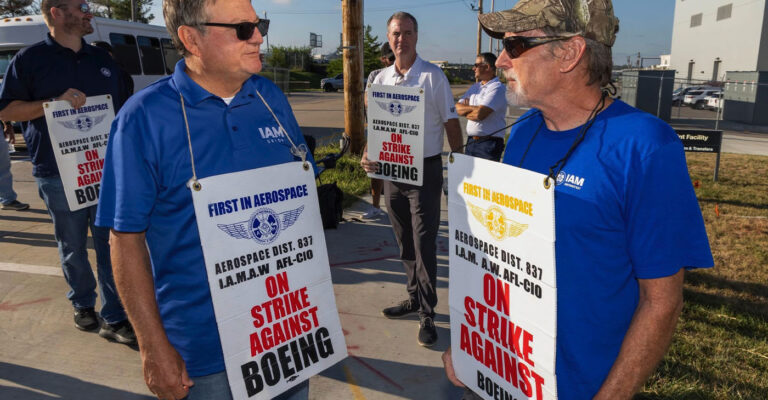By Stacy M. Brown
Black Press USA Senior National Correspondent
Jody Bennett, vice president of the International Association of Machinists and Aerospace Workers (IAM), does not speak in the polished language of corporate press releases. His words land like hammer blows, stripped of pleasantries, sharpened by fatigue and frustration. “I gotta tell you, I’m tired,” Bennett told the Black Press in an exclusive Zoom interview. “I’m really without words for just my distaste for Boeing as a corporation and the lack of appreciation they have for the people who have made them the company that they are.” For eight weeks, more than 3,200 members of IAM District 837 have stood on picket lines outside Boeing’s St. Louis defense plants. They build advanced military aircraft and weapons systems. They are machinists, technicians, and mechanics. They are Black, white, Asian, Hispanic, and Pacific Islander. They are fathers and mothers, sons and daughters. They are the skilled hands behind machines of war. And they are out of work because Boeing refuses to sign an agreement that would allow them to return to the shop floor with dignity. Bennett detailed how the strike reached this stalemate. Workers rejected three offers from Boeing, including a pre-approved strike settlement agreement overwhelmingly supported by members. “With that vote, they gave them a hundred percent assurance that if they signed on the dotted line, our folks would be back to work,” he said. “But they have rejected that offer. And they’re only going to discuss terms that fall within parameters that they set, which would be reallocating money within the original offer, but not adding additional money. So, in essence, they won’t improve their offer.” He said the union has even requested mediation. Boeing has not agreed to dates. “Right now, the ball is in Boeing’s court,” Bennett said. The vice president called the IAM a democratic union where the rank-and-file—not leadership—dictate the direction. “We presented it, told them why we thought it was a good deal, and they told us that they didn’t think it was a good deal because it fell short in some areas,” Bennett explained. “Once that happens, we respond based on the membership. They tell us what to go to the table and try to get, and we speak on their behalf. At the end of the day, our members are gonna dictate to us what we do as an organization.”
That organization includes thousands of Black workers who make up between 15 and 20 percent of the membership. “Some of these guys are strike captains,” Bennett said. “But they’re pillared into the community too. When you go on strike, it’s not just about the workers and their families. It’s about the entire community. The mom-and-pop shops. The little restaurants. Our guys stop at the store every day, get a cup of coffee, and maybe get a bite to eat. It’s having a negative impact on those communities. And in particular, in a lot of our minority communities, it’s even a greater impact because they already lack a lot of the necessities and availability to groceries and other services they need. They need these good-paying jobs. We’ve got people trying to build their communities back up. And this hinders that.” Bennett said morale remains strong, but the strain is real. “It’s surprisingly good,” he said. “I think this is our eighth week. And you know how difficult it can get if you’ve been involved with organized labor. After about three or four weeks, it really takes a toll. A lot of stress on you, your spouse, and your children. You don’t have that steady check coming in. In many instances, you’ve lost your insurance.” “These are guys that have for the last year been preparing for this, saving money,” Bennett continued. “But at the same time, you need that security blanket. One of the things that aggravates me most about a lot of large corporations is that they think they’re the only ones that have an investment in the success of their company, without understanding that when I go to work for you, I’m looking to make a career. I buy a house. I buy cars. I save money to put my kids through school. I’m paying taxes to the community. I’m using services within the community. So, I’ve got a lifetime investment too. I’m counting on management that recognizes and values my skills.” Bennett reminded that during the pandemic, these same workers were called essential. “Other people were staying home. These folks were coming to work because what do they produce? They produce military aircraft and weapon systems,” he asserted. “They’re highly skilled, intelligent. These are very advanced weapon systems. Not everyone can do it. Boeing should recognize that.”
The company does not, Bennett said, and its refusal to move is sharpened by the billions it receives from the government. “Every time Trump goes overseas, he’s cutting deals for Boeing to get work,” Bennett said. “Boeing just got awarded the F-47 aircraft. That could end up being a trillion-dollar deal over the years. Don’t tell me, Boeing, that you’re not willing to give people in the Midwest wages that you’ve already given 34,000 people in the Pacific Northwest. “And even then, the wages still wouldn’t be the same, even if they gave the same percentages. Dollar to dollar, donut to donut, it’s as fair as you can get. But Boeing has to realize our members run the show, not me, not their committee. They’ve offered something rejected three times because it doesn’t meet the needs of our people. And we’re gonna do everything we can to meet the needs of our people.” He placed the strike within a global framework. Aerospace work, he said, is one of the last bastions of manufacturing in America. “We’ve gotta raise the living standard for people in this country who still do high-skilled work,” he said. “These corporations don’t want to make a distinction between skilled labor and unskilled labor. Aerospace is not widgets. It’s not coat hangers. We need to be paid in accordance with the jobs we perform.” The strike is also political. Elected officials, including Senator Josh Hawley, Representative Emanuel Cleaver, and state caucuses, have shown support. Bennett said Senator Bernie Sanders will hold a town hall with workers. “Mr. Sanders has been very vocal about these companies taking advantage of government contracts while leaving our people’s wages behind,” he said. “We’ve got people that work out here still that need assistance with the food stamps. You’re one of the biggest corporations in the world, and you’ve got guys that need assistance to put groceries on the table. While we’re the taxpayers, on the hook for the product you’re making.”
Bennett’s message to voters was blunt. “When you’re going to the poll to cast a vote, all votes matter,” he said. “You’re not only voting for your future, but your neighbor’s future, and the future of everyone in your community and this country. You need to look at the laws that affect the working family. It’s a shame the majority of issues get nailed down to two or three hot topics—guns, gay rights, abortion, and immigration. But what they forget to really look at are the laws that affect working families.” Asked what issues the union would refuse to concede, Bennett did not hesitate. “That’s gotta be the wages for our top-tier people in the middle two years of the contract offer,” he said. “They shouldn’t be treated any differently than any other employee. That’s why for us there must be either a flat dollar amount given or a percentage wage increase so the top keeps moving up.” As the weeks drag on, he warned that bitterness will remain. “You just don’t go back to work after something like this, and tomorrow it’s the same as when you left,” Bennett reiterated. “It’s not gonna be. And I would venture to guess they’re probably gonna start saving money immediately for the next round of negotiations. If Boeing plays the same games, it’s gonna be an even tougher path to get a deal.” The strike has already shut down Boeing’s St. Louis output. “They’re not putting anything out,” Bennett said flatly. “There’s just no way they can replace 3,200 workers. They’re not getting any production done.” He left little doubt about what is at stake. “We want a big sustainable middle class because we built America and we continue to drive America,” Bennett said. “And it ain’t a billionaire that’s doing it.”







